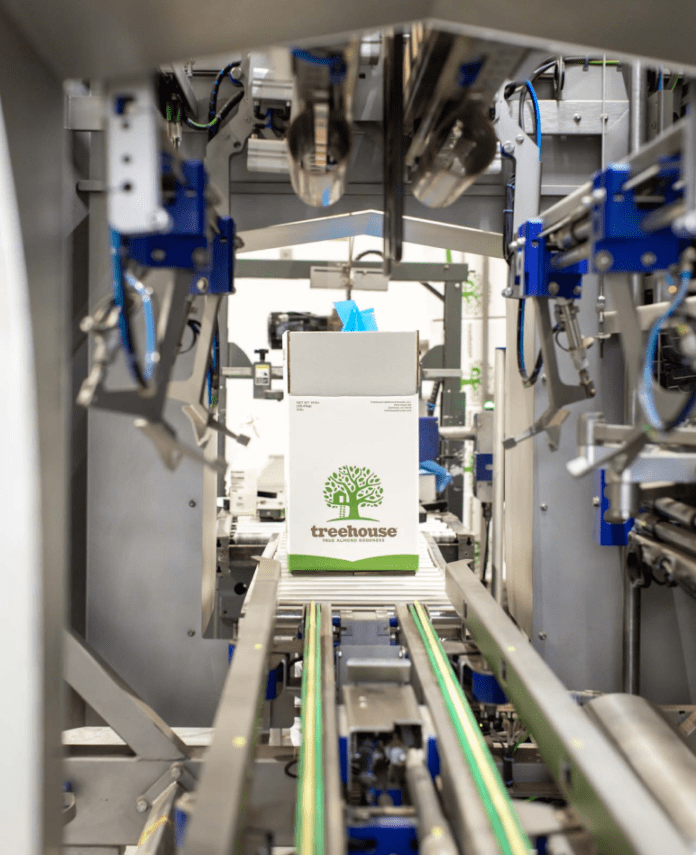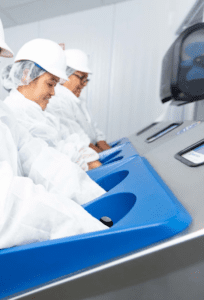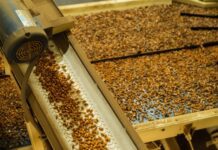
Efforts to ensure the safety of California almonds, viewed as a critical function for the long-term health of the industry, are being played out at the state level through initiatives from the Almond Board of California and at individual farms and processors across the state.
One such huller/processor with a long history of attention to food safety, Treehouse California Almonds of Earlimart, Calif. heightened its emphasis on food safety two years back, bringing on Lizzette Casas as director of food safety and quality and adding staff to its quality assurance program.
Casas, who holds a degree from UC Berkeley in molecular and cell biology and who has worked in the almond industry for 15 years, has since helped Treehouse improve on what she said was already a robust food safety program.
“Treehouse, and the almond industry in general, has been at the forefront of making progressive changes in food safety,” Casas said. “They brought me on two years ago to put even more of an emphasis on food safety.”
Prior to Casas’ arrival, the Quality Assurance manager at Treehouse was wearing a couple of different hats. In addition to managing the company’s food safety and quality program, Brian Ball was helping manage the operation’s facilities expansion, which over time became a sizable commitment given the company’s handle has essentially doubled over the last five years.
“The management at that point thought, ‘We really need to create two positions because capital projects are very important, expansion is very important, but we need someone who’s solely dedicated at the director level to take care of food safety and quality,’” Casas said.

Next, Treehouse doubled its food safety and quality staff, giving Casas the workforce she deemed necessary to ensure proper steps were taken to address food safety at all points of the process.
Casas now has staff monitoring the food processing lines, ensuring workers wash hands and other good manufacturing practices (GMP) are being followed, including that employees are participating in the captive footwear program, which involves leaving work shoes at the plant each night; their bump caps are clean to ensure the caps aren’t introducing any foreign material to the lines; equipment is operating properly on the pasteurization line and proper documentation is occurring; and that the positive air pressure filters are being monitored to ensure they are removing any contaminants brought into the plant.
Casas also has employees dedicated to reviewing all laboratory documentation before almonds are shipped as a final step in making sure almonds are safe for consumers. And finally, there are employees responsible for reviewing audits from suppliers and customers and reviewing corrective actions to ensure the company continues to focus on improvement, which Treehouse views as a critical part of its overall growth strategy, Casas said.

Starts in the Orchard
On its website, Treehouse declares that food safety is the foundation of its operation, citing its “diligent process supervision” as a cornerstone of that effort. And Treehouse notes its food safety commitment starts in the orchard where its growers focus on good agricultural practices (GAPs) to help ensure almonds are of the highest grade and standards.
“Our close relationships with these growers allow for unparalleled supply chain transparency and traceability of almonds down to the exact grower and field,” according to its website.
“We have really strong partnerships with our growers, and two of our largest growers are actually part owners of the company,” Casas said. “So, there is a lot of transparency there, and there is also an expectation that they practice good agricultural practices and integrated pest management to make sure that their quality is up to our standards.
“We are constantly talking to them, checking in with them and just making sure that their programs are up to par with what we need and what our customers expect, and that whatever is brought into the facility is as safe as it could possibly be,” Casas said.
Meeting customer expectations has provided a major incentive for Treehouse’s dedication to food safety over the years, Casas said.
“Treehouse has a history of working with really big consumer-branded customers,” Casas said, “and the demands of these customers have kept Treehouse on that leading edge of food safety and quality.”
Even the company’s huller, which handles roughly 60% of the company’s output, is certified under GMPs, and huller-manager Dan Lawson has been through training in GMP, HACCP (Hazard Analysis Critical Control Points) and BRCGS, a third-party certification service with global standards for food safety.
Food safety is also top-of-mind with any new facility expansion at Treehouse, Casas said, in part because Ball, the company’s former QA manager, is heading capital projects.
“It’s been a blessing for me because his background is in food safety, and now he is helping with equipment design and equipment installation and he has food safety at the forefront of his mind,” Casas said. This, coupled with support and a focus on food safety and quality from Treehouse COO Carl Tristao, makes for equipment design and installations that are best-in-class for sanitation and hygiene, she said. For example, Treehouse recently added a new state-of-the-art sanitation room, and all new lines are equipped with Cleaning-in-Place mechanisms, which are sanitation systems that can be closely monitored and controlled because cleaning is conducted without dismantling equipment, making sanitation more effective and less prone to error.
“It really is a team effort, and the safety of our customers is the most important thing for all of us,” Casas said.
Broader Focus
Treehouse’s dedication to food safety is part of a broader focus by the California almond industry to ensure safe product, a focus that includes the dedication of resources at the Almond Board of California (ABC). Among its initiatives, ABC educates growers on good agricultural practices in orchards and works with hullers, shellers and handlers on addressing food safety from harvest through processing.
“ABC has been at the forefront of food safety with mandatory pasteurization in place since 2007,” said Tim Birmingham, ABC’s director of quality assurance and industry services. “Additional programs such as Pathogen Environmental Monitoring are also employed to help mitigate post-process contamination issues. And finally, ABC has provided guidelines detailing conditions for maximizing almond quality and shelf life.”
From its headquarters in Earlimart, Treehouse California Almonds takes pride in knowing it is doing its part to ensure California almonds are safe and of the highest quality. As Casas put it, “When one nut goes down, it affects the entire industry, and that is not something you want your brand to be associated with. So, we want to do our part.”










